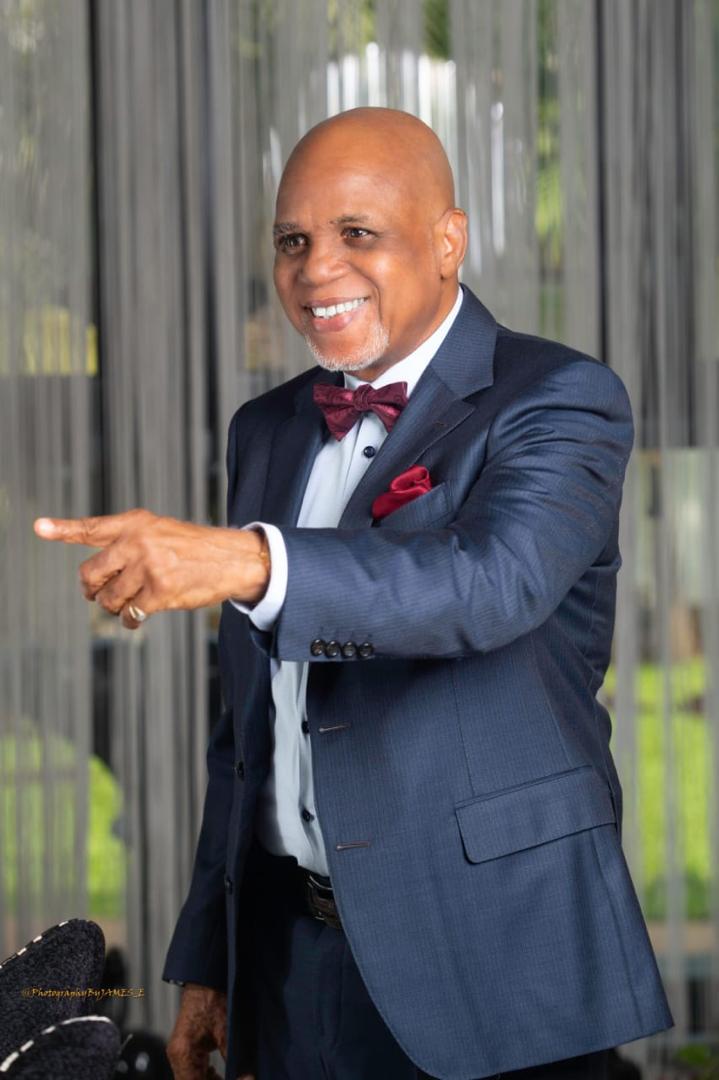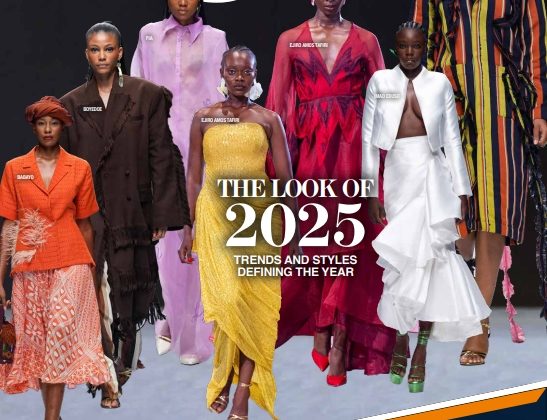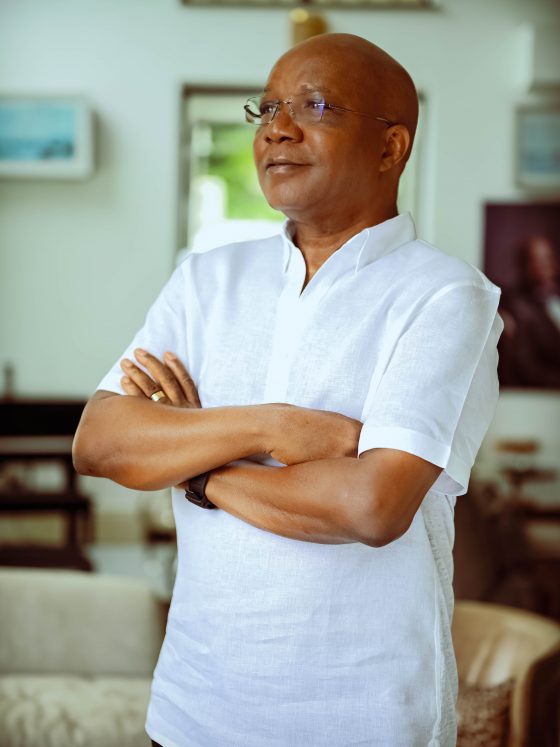As you celebrate your 80th birthday, how do you reflect on the journey from your early days in broadcasting to becoming a titan of the advertising world?
I think it’s been a very exciting journey. When I look back 53 years, actually, 53 plus another seven, which is probably about 60 years. That was when I started off in broadcasting and transitioned into advertising 53 years ago, exactly 53 years last week, on the 6th of December. Looking back from Broad Street, where I started as an account executive trainee, to where I am today, it’s been a journey of constantly learning, inventing, and reinventing. Meeting all sorts of incredible people on that journey. And I think for me, the joy is looking back at the people that I have met with those who have impacted my life. Some of whose lives I have also impacted. And when we look at the balance sheet, one cannot but give glory to God. It’s been an adventure that if I had the opportunity to live it again, I probably would follow the same path.
You made a significant career shift from broadcasting to advertising in the early 1970s. What was the driving force behind that decision, and how did that move influence the course of your life?

It is people who affect other people’s lives. I saw people who transitioned from broadcasting to advertising, and I saw the change in their lives. People like the late Chief Banjo Solana, people like the late Segun Ogunbunmi, people like the late Kehinde Adeosun, and then you have the likes of Chief Olu Falomo, who is still very much alive. And Chief Femi Adeniyi Williams, who is also still alive. And as I said, as a young boy at the time, I just saw some kind of a radical change in their lifestyle. And I felt that, look, I could do with that, and it was a time when the opportunities abounded. I followed my dream. I pursued it. And on December 6, 1971, the door was opened for me. And since then, there hasn’t been any looking back.
You co-founded Insight Communications in 1980, which became Nigeria’s leading advertising agency. Looking back, what were some of the key challenges and rewards of building the agency from the ground up?
It would be modest of one to say it was co-founded. But in the true sense of the word, it couldn’t have been co-founded. If you understand that, at the time the company was founded, the young people that I took along with me were all at the executive level. I was at the C-suite. I was the deputy managing director of the company. So, it couldn’t have been something we sat down to say, “Can we form a company?”. So, it was something that I wanted to do. So, I started the company. But I had to pull people along because I needed other people to work with me. It’s not a business for one person. So, I found these young people that I thought had the same mindset as myself. In fact, by the time I called them, the company had been founded and registered. We started in extreme difficulty; we started with one client whose budget was N15,000 per month. We started very small, and we had a working capital of 128,000 Naira, and we had debt of 104,000. So, really, everything in the office was on hire purchase without the help of a godfather.
I, as the leader of the team, the visioner of the company, I knew that we had no alternative but to succeed. And so, we threw everything at it, knocking at people’s doors. In 1980, when we started the company, the total advertising spend in the country was not even up to 20 million Naira in total. It was small, and in 1981, 82, and 83, advertising was classified as being in the non-preferred sector of the economy. People didn’t quite understand what it was, and people didn’t appreciate it, and it was believed all those who worked in the sector were just wasting their time because it was not recognised by the government. To put it in perspective, in 1981, we went to the bank to seek a 10,000 Naira loan. It was turned down because the bank said we were in the non-preferred sector of the economy. Now, that profession, that industry today contributes about N650 billion to the Nigerian economy. If we hadn’t had the vision that we were playing in a major sector, we would have backed up and withdrawn. But we took a look at what was happening globally with advertising, what is now called marketing communications, and what was contributing to global GDP and stayed in there. And I must tell you that our growth was very rapid. Because by our 10th, 11th year, we had become the number two biggest advertising company in Nigeria.

Your pioneering role in Nigeria’s marketing communications industry is unparalleled. You’ve founded several firsts, such as Quadrant (Nigeria’s first PR consultancy) and All Seasons Mediacom (Nigeria’s first media independent). What inspired you to pursue these innovations, and how did you manage to turn them into such successful ventures?
We tried to follow the rules. At the time, all advertising companies offered PR as collateral, but the government of Nigeria didn’t accept it, and it shouldn’t be the case. If you wanted to offer PR, it’ has to be from a totally different perspective. It must come from a company that does exactly that. And so, we decided to follow the rules and set up the Quadrant Company in 1990.
Basically, we had a small PR department and then turned it into a company. We registered the company and started playing in the field. But we were very clear about what that company had to bring to the industry in terms of professionalism, in terms of expertise, and all. And as I told you earlier on, I took a global perspective of the business. I saw the way the business was running globally. And I knew that media independence was beginning to sprout in different parts of Western Europe and America. And I also was quick to recognise what that unit was contributing to our turnover. And that it required better expertise, technical skills, and all that. And so, we decided to invest. A couple of years later, other advertising companies also followed. But I think it would not be immodest to say that we then formed the catalyst for what is now called today’s Nigerian Institute of Public Relations and the Media Independence Association of Nigeria.

Tell us a bit more about Troyka
You know, as we went on our journey, we found out we were sprouting different companies, and we were putting assets and human capital to run these businesses, but at one point in time we felt we needed a holding company structure where we could impact from the Centre what these various companies were doing. So that they could deliver better to their clients. So that we had to quickly build the strength that would support these individual companies and operate with one standard. So that it doesn’t matter which of our businesses you went into. The likelihood is that you’ll find the same standards in terms of the quality of people, in terms of the look and feel of the organisation, and in terms of, if you want to call it, the culture. So, if you’ve seen one company, you’ve seen them all. So that’s why we had to create Troyka as an umbrella to give that kind of shade and support to our various individual companies.
In 2015, you took the bold step of entering into an equity partnership with Publicis Groupe, scaling Troyka to a global level. What was the vision behind this partnership, and what impact has it had on Troyka’s ability to compete globally?
I am a product of international exposure that came through partnerships. When I was building my career, the company that I worked for at the time, Grant, had partners. And I had the privilege of being a student in the London office. And I could see the benefit of the partnership that Grant had with Michael Erickson at the time. So, from when we started, we’d always pursue finding a technical partner that would aid us in the area of manpower development, specifically because with knowledge comes strength. We were quick to recognise that we needed the knowledge. Where would you get that technical knowledge? You have gone to school everywhere in the world, but you need to work with those who have been in the business much longer than yourselves, who operate in a more sophisticated market, so that your guys can learn. From that partnership, we sent people to different parts of the world for training. The benefit of that reflects in the quality of work that we do. That, for me, was very, very important. So, we partnered with the third biggest group in the world, the Publicis Group, headquartered in Paris but with offices in different parts of the world. What does that do? It opens the door for our people to continue to leverage the strengths of that kind of company into helping us deliver superior quality products and services to our clients locally. And that’s why we went into that partnership.
Having been awarded numerous national and international recognitions, including the prestigious advertising man of all time, what does leadership mean to you? How has your approach to leadership evolved over the years?
I think you have to talk to those that I have been privileged to lead. But I think that, to be fair, I have gotten more than my own fair reward for the service that I have rendered. I got an award two days ago from the Out of Home Advertising Association of Nigeria, where they gave me an award at the 2024 Legion in the industry. That award marked the 85th award that I would receive in my career. This is very humbling. And I just cannot thank all those who have judged me worthy of these various awards, which include two from two of Nigeria’s topmost universities, the Abafemi Awolowo University and the University of Lagos, respectively. Including one that I got from my nation, the officer of the Order of the Niger, the OON by the President, I think in 2022. These things have been humbling for me. As I said earlier, I’ve been very lucky with the people that I’ve been privileged to work with. You have your vision; you have a dream. And these people understand the dream. And the key to that dream, and together we actualise the dream.

Throughout your career, you’ve emphasised professionalism and integrity. What advice would you give young professionals on how to navigate challenges while maintaining their values and achieving success?
Well, life is not that easy. I think there’s a mentality out there that you can fast-track everything. You know, you really cannot fast-track everything. It’s not possible. Particularly businesses that require professionalism, you have to serve some sort of apprenticeship. And that’s what I tell everybody. Look, don’t come and tell me about some guy who did some out-of-this-world thing or say to me this guy, who just left school, is sitting in his room and doing something phenomenal with his phone. It can’t last. If you want to pursue a professional career in anything, you have to learn. Firstly, you have to come with some knowledge, and then you must have some apprenticeship. Let me give you an example. The longest-serving apprentice that I know of is a fine gentleman called Jimmy Awosika. He’s the group managing director of Troika. He’s the CEO of the group. He took over from me. He’s been serving his apprenticeship for the past 46 years with me. I recruited him in 1978, and he’s been with me ever since. If you want to find a man in this country who understands marketing communications, then Jimmy Awosika is the man. He understands it like the back of his hands And I can point you to a couple of other guys who are doing so well, even who had worked with us. So, and it’s not just us; I mean, banking, whatever the profession is, you have to serve some apprenticeship. There’s no magic about it. You can move on the fast track, no problem, because you have some extraordinary talents, but for crying out loud, to be able to do it well, you have to serve some apprenticeship. That’s my position.
You are known as a philanthropist with a quiet yet powerful impact. Can you share more about your philanthropic journey and what drives your commitment to causes like the National Cancer Prevention Programme and your contributions to education?
If you are a product of my own kind of circumstance and you anchor at where you are, you have to look back and say, you need to do something; you need to give something back to society. I lost my father as a 13, 14-year-old boy. My father was the breadwinner of the family. And I had siblings, and I happened to be the first child. My mother was a petty trader. So that actually changed the course of my life. If you are able to wriggle out of that, and then you become a professional of very high standing as I have turned out to be, then the least you can do is to impact society with the things that you do in terms of helping people, particularly in a society like ours, helping people through education, through communal help. Because to be honest, government cannot do everything. It’s not possible. I’ve done, I keep doing my little bit.
When the University of Lagos approached me that I should help with the School of Media and add one floor to their building, which was the brief at the time, I agreed on the basis that I would send my people there to take a look. They went and took a look and saw that the building could not carry one floor. I said to the university, I’m sorry, I can’t do it because the building will collapse; I opted out. But they were persistent, so we decided the best thing to do was build from scratch a two-story, multifunctional media school which I did.
Looking back at your career and the incredible milestones you’ve achieved, what would you say is your greatest legacy? What do you hope people will remember you for, both in the professional world and beyond?
I think that I would very much like to be remembered as someone who changed the face of marketing communications in this country. Because indeed, when the history of marketing communications is written in this country, I suspect that a fair amount of space will be devoted to what I contributed. I gave it the bounce that it required. I was also lucky to be the president of our association at some point in time, where I waved the flag and was selling what we were doing as an organisation.
As you celebrate your 80th birthday, what are your personal reflections on ageing, success, and life in general? How do you continue to find fulfilment and purpose in the later stages of your life?
You know it’s funny how age just grips you. Suddenly I am 80; I can’t believe it. I don’t look or feel 80, to be honest. I’m lucky in that sense. But you know, you suddenly look back and say, eight zero. It’s all like yesterday. I have spent the past three years of my life just generally enjoying myself. Which is incredible. For me, advertising is a profession that you enjoy every day because there’s something different every day. The briefs are different, so it’s plenty of fun. And that’s what I reflect on in my life. I’ve enjoyed every minute of it. Of course, there have been stresses as well; make no mistake about it.I remember in my early days when we couldn’t pay salaries on time. We still pay but instead of paying on the 26th of whatever, we probably pay on the 10th of the following month. I remember those days; I remember hitting the streets and all that. But all of those days have flown away.I am in good health. I walk one and a half hours every morning except on Sundays. I think what I spend my time now really enjoying is my grandchildren













